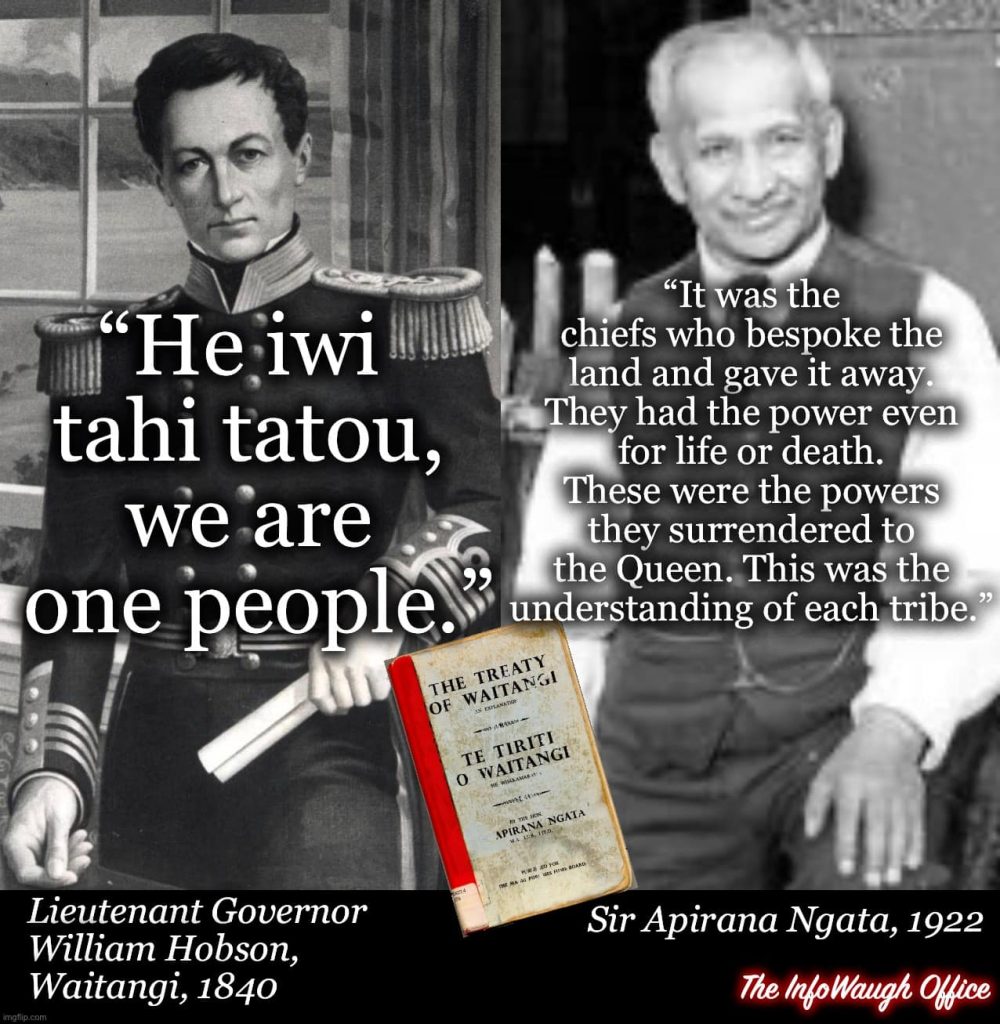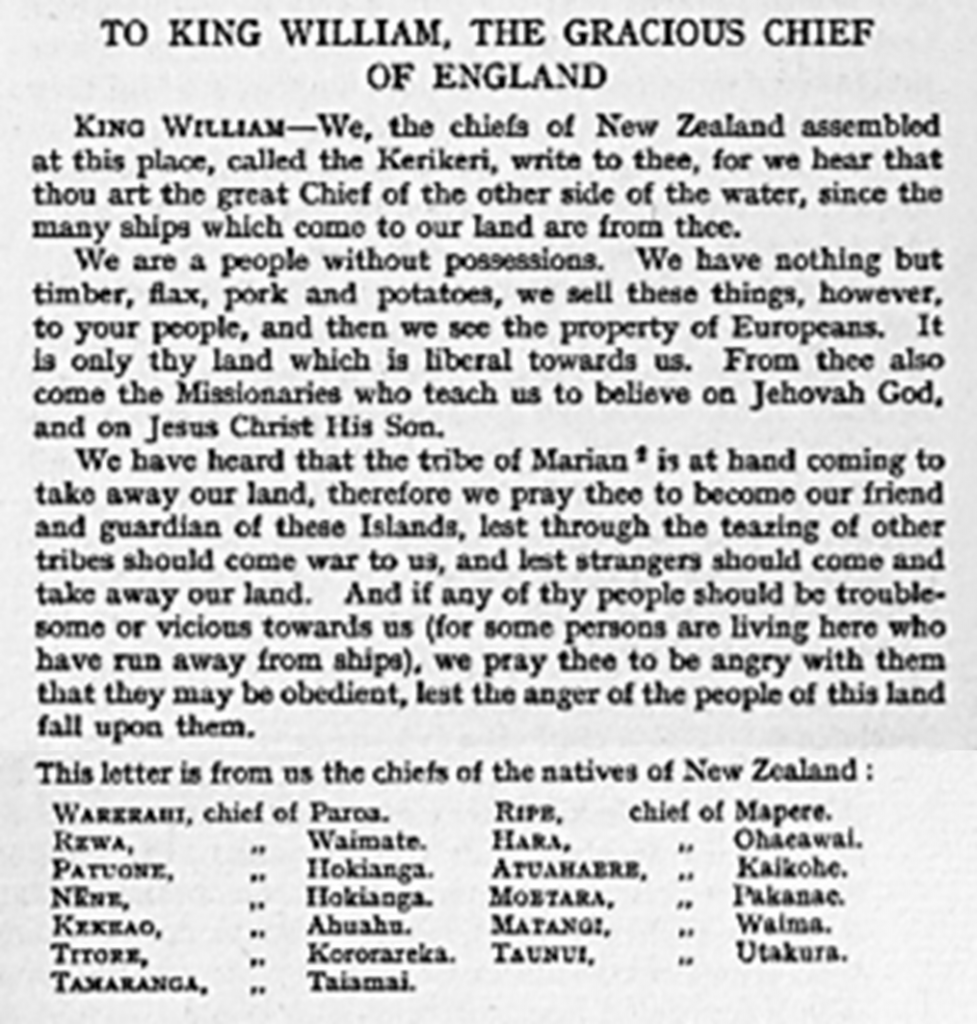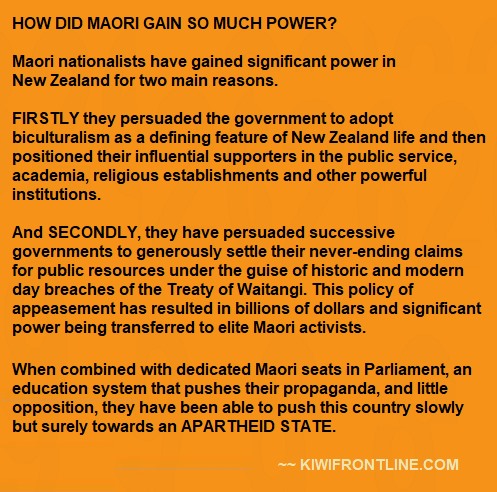
The essence of the treaty is one people not two


A look back in history at this petition by Maori chiefs shows a different take on what constituted taonga. Notice there is zero mention in 1831 of Maori owning things that they claim to own today such as all the land, water, fish, wind, or radio waves. Instead, what we read is the word taonga being used in the context for personal possessions and private property.
The first Maori dictionary produced by Cambridge University’s Professor Lee in 1820 states the following meaning for ‘taonga’,
“Property procured by the spear”
It’s hard to imagine radio waves, rivers, lakes, and fish being procured by the spear. But how representative is Lee’s meaning of taonga? His definition and dictionary meanings were assisted by Ngapuhi chief Hongi Hika. Yes you read that correctly. To Hongi, taonga was his own possessions and didn’t include the things that Maori claim to own today like rivers and radio waves. It seems these were later procured by the pen assisted by a misrepresentation of history.

TO KING WILLIAM, THE GRACIOUS CHIEF OF ENGLAND
KING WILLIAM — We, the chiefs of New Zealand assembled at this place, called the Kerikeri, write to thee, for we hear that thou art the great chief of the other side of the water, since the many ships which come to our land are from thee.
We are a people without possessions.
We have nothing but timber, flax, pork and potatoes, we sell these things, however, to your people, and then we see property of the Europeans.
It is only thy land which is liberal towards us.
From thee also come the Missionaries who teach us to believe on Jehovah God, and on Jesus Christ His Son.
We have heard that the tribe of Marian [the French] is at hand coming to take away our land, therefore we pray thee to become our friend and the guardian of these Islands, lest through the teazing of other tribes should come war to us, and lest strangers should come and take away our land.
And if any of thy people should be troublesome or vicious towards us (for some persons are living here who have run away from ships), we pray thee to be angry with them that they may be obedient, lest the anger of the people of this land fall upon them.
This letter is from us the chiefs of the natives of New Zealand:
Warerahi chief of Paroa
Rewa chief of Waimate
Patuone chief of Hokianga
Nene chief of Hokianga
Kekeao chief of Ahuahu
Titore chief of Kororarika
Tamoranaga chief of Taiamai
Ripe chief of Mapere
Hara chief of Ohaiawai
Atuahaere chief of Kaikohe
Moetara chief of Pakanai
Matangi chief of Waima
Taunai chief of Hutakura
Source:
https://treatygate.wordpress.com/2012/11/04/1831-maori-petition-to-king-for-protection/

Auckland University has apologised for publishing an article that described the lobby group Hobson’s Pledge as “a racist and militantly anti-Māori group”.
Former National Party leader Don Brash is the spokesperson for Hobson’s Pledge. He said after reading the article, he asked the university to retract the statement about the group.
“Hobson’s Pledge was described as racist and militantly anti-Māori and that is an absolute nonsense. We are not racist and we are not anti-Māori. The co-spokesperson for Hobson’s Pledge is herself Māori, we are in no sense anti-Māori and in no sense racist,” said Dr Brash.
Dr Brash said he was satisfied with the university’s apology.
He said the Hobson’s Pledge group lobbies for the same political rights for everybody…..
https://www.radionz.co.nz/news
The Crown and Auckland Council’s genuflecting to Ngati Whatua and its various hapu based on their claim to mana whenua over the Tamaki Isthmus is arrant nonsense.
It is often asserted that Ngati Whatua “gifted” the land on which Auckland City now stands to the Crown, thus entitling them to be involved on an ongoing basis in running the city.
THE LAND WAS NOT “GIFTED” at all, but sold to the Crown for cash and goods. Once something is sold, it’s gone for good, and the seller has no further claim over it or ongoing rights to say what happens with it.
Claims to the contrary can be likened to selling someone a house, then demanding a perpetual say in how it is renovated, decorated and landscaped.
In any event, like so many early New Zealand land sales, Ngati Whatua’s claims to ownership at the time of sale are tenuous at best.
Ngati Whatua were not the first occupants of the Auckland area. Originally based further north, they colonised the locality around 1750 by exterminating its former occupants, Te Waiohua.
What goes around comes around. In the 1820s, the Tamaki Isthmus was repeatedly invaded by musket-toting Ngapuhi. The Encyclopaedia of New Zealand records that as a result: “much of the isthmus was abandoned as tribes sought shelter in the Tainui region.”
Historian, RCJ Stone, notes: “fear of Ngapuhi prevented them [Ngati Whatua] from occupying their old home for many years afterwards, indeed, not until Auckland was founded [in 1840] did they feel safe.”
Ngati Whatua thus “sold” to the Crown land they’d cravenly vacated more than a decade before. Land they no longer occupied or controlled in any meaningful sense. This placed the Governor and his troops between Ngati Whatua returnees and renewed hostilities from Ngapuhi.
Payment from the Crown also underscored to neighbouring tribes that the mana of the land remained with Ngati Whatua, though if you run away and stayed away for more than 10 years rather than standing up for yourself, you are actually cowards with no mana.
While a clever stroke of business from both a practical and a Maori perspective, this historical action hardly supports demands from Aucklanders of Anglo-Ngati Whatua descent for special treatment based on having some Maori ancestry.
By Jack Leslie
http://www.kiwifrontline.com/